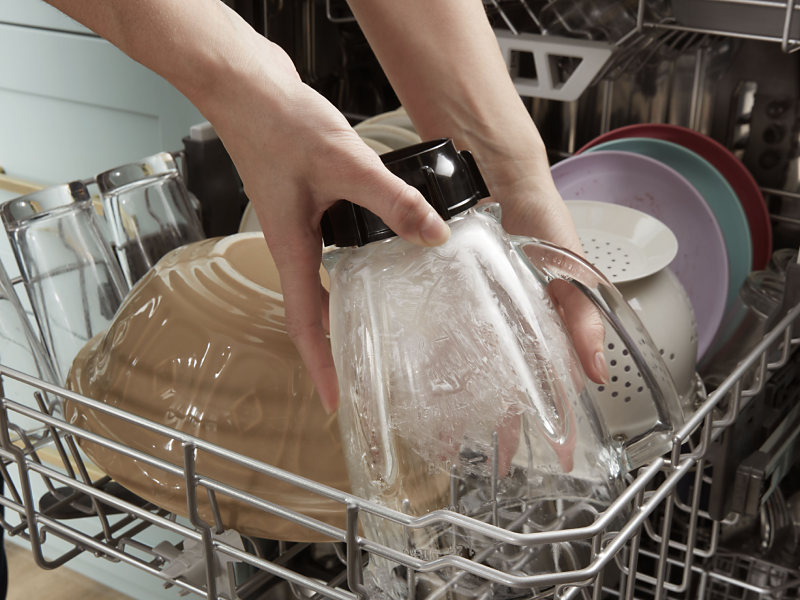Yes, you can use your dishwasher without hot water, but it may not clean effectively. The appliance usually heats the water to the appropriate temperature for optimal cleaning.
Dealing with a cold water supply in your kitchen doesn’t necessarily mean your dishwasher is out of commission. Dishwashers are designed with internal heaters to raise water temperature to the desired level for cleaning your dishes thoroughly. This adaptation is a relief to those facing temporary hot water outages, but beware, cleaning power could be compromised.
Your dishwasher’s performance depends on hot water to dissolve detergents and sanitize dishes, so running it with cold water might result not only in less-than-sparkling dishes but also in a higher chance of bacteria remaining. Before operating your dishwasher during a hot water outage, consult the manufacturer’s guidelines or consider options for fixing your hot water supply to ensure your dishes come out as clean as possible after each cycle.
Table of Contents
The Role Of Hot Water In Dishwashers
Imagine trying to wash oily dishes with cold water. Tough, right? This illustrates the essential role of hot water in dishwashers. It’s key for breaking down grease and grime. But what happens when your hot water supply hits a snag?
Heating Mechanisms In Modern Dishwashers
Most dishwashers come with built-in heaters. They boost water temperature for optimal cleaning. Your dishes get a thorough wash even with a cold water supply.
Let’s look inside a dishwasher:
- An element heats the water
- Sensors monitor the temperature
- Controls adjust the heat as needed
Impact On Cleaning And Sanitation
Hot water not only cleans, it sanitizes. It kills bacteria and ensures safety. Without it, a dishwasher’s sanitation cycle might not work as planned.
Cleaning Aspect | With Hot Water | Without Hot Water |
|---|---|---|
Grease Removal | Effective | Less effective |
Sanitation | High | Compromised |
Drying | Faster | Slower |
In summary, dishwashers rely on high temperatures for peak performance. No hot water? Your machine’s heater has got you covered, ensuring clean, safe dishware every cycle.

Credit: www.doityourself.com
When The Hot Water Supply Is Interrupted
Imagine you’re about to run your dishwasher, and you realize there’s no hot water. It’s a common scenario that can happen anytime. Before you panic, let’s explore what it means to operate your dishwasher without a hot water supply.
Common Reasons For Loss Of Hot Water
Losing hot water can happen for several reasons:
- Water heater malfunctions: Issues with the heater itself.
- Power outages: No electricity to power the heater.
- Plumbing issues: Broken or leaking pipes.
- Seasonal maintenance: Temporary shutoffs during service.
Immediate Implications For Appliance Use
When the hot water isn’t flowing, appliances like dishwashers might not work as expected. Here’s what happens:
Appliance | Impact |
|---|---|
Dishwasher | Reduced cleaning power. Soap may not dissolve as well. |
Washing Machine | Potential for cold-only wash cycles, affecting fabric cleaning. |
Your dishwasher is designed to use hot water. Without it, grease and grime may not go away. You could use the dishwasher, but a cold water cycle might not give you the sparkle you expect. Always check the manual first. Some models have built-in heaters that warm up the water.
Dishwasher Features And Alternative Functions
Finding yourself without hot water doesn’t mean your dishwasher loses its sparkle. Modern dishwashers come with clever features. They can tackle dirty dishes with room temperature water. Let’s explore these nifty functions that save the day.
Built-in Heating Elements
Many dishwashers are equipped with built-in heating elements. These can heat up water internally. So, no external hot water is necessary. Your machine takes care of everything! Look for the ‘heated wash’ or ‘sanitization’ setting to activate this feature.
Cold Water Wash Cycles
Some models come ready with cold water wash cycles. These programs are designed to work effectively without hot water. Not only is this function resourceful during a hot water outage. It also conserves energy on a regular basis.
- Energy-saving: Uses less electricity.
- Milder on dishes: Gentle for delicate items.
- Eco-friendly: Reduces carbon footprint.
These features prove that no hot water is no problem for your dishwasher. Check your user manual to find out if your model has these capabilities. Embrace these solutions and make your dishwasher work for you, hot water or not!
Pros And Cons Of Operating Without Hot Water
Dealing with a cold water situation in your home might have you asking: “Can I still use my dishwasher?” This common kitchen dilemma has its pros and cons. Let’s explore the impact of operating your dishwasher without hot water.
Effectiveness Of Cold Water Cleaning
On the upside, modern dishwashers are quite adept. They come with advanced features designed to tackle dirt with less dependence on hot water. Certain detergents are engineered to work in cold water. Yet, the cleaning power is often reduced without heat to dissolve grease and grime.
Concerns arise with tough food residues. These might not break down as effectively. Dishes may emerge less sparkling than usual. Here’s a quick list of cold water cleaning’s pros and cons:
- Pros:
- Energy savings from not heating water
- Some detergents are cold-water friendly
- Cons:
- Potential for less thorough cleaning
- Grease and grime might not dissolve well
- Increased rinse aid may be necessary for clarity
Risk Of Damage To The Dishwasher
It’s important to recognize that consistent cold water use might harm your dishwasher. Dishwashers are designed for hot water use. Here’s why cold water could lead to problems:
Impact | Explanation |
|---|---|
Residue Buildup | Detergent might not dissolve fully, leading to buildup |
Wear and Tear | Increased strain on the appliance over time |
The absence of hot water could also shorten your dishwasher’s lifespan. Regular maintenance becomes vital. Without hot water to sanitize, health concerns could also arise. Balancing these risks with the convenience of appliance use is crucial. Consider seeking professional advice before making this a regular practice.
Adjusting Dishwasher Settings And Detergents
Experiencing a lack of hot water doesn’t mean waving goodbye to using your dishwasher. With the right settings and detergents, your dishes can still emerge sparkling clean. Let’s explore how to adjust dishwasher settings and choose the best detergents for cold water washing.
Selecting The Right Cycle
Most modern dishwashers offer a variety of washing cycles. Choosing the correct one is key when hot water isn’t available:
- Eco or Cold Water Cycle: These settings are designed for energy efficiency and often use lower temperatures.
- Heavy Cycle: While this option uses more water, it compensates for lower temperatures with increased washing time and intensity.
- Rinse and Hold: This is a pre-wash setting to prevent food from drying on dishes before a full cycle later on.
Adjust the temperature manually if your dishwasher lacks specific cold water settings. Set the dishwasher’s thermostat to the lowest possible temperature.
Detergents For Lower Temperatures
The detergent choice is crucial when running your dishwasher with cold water. Here’s what to consider:
- Opt for enzymatic detergents. These are effective at breaking down food residues at lower temperatures.
- Choose liquid or gel detergents. They dissolve quickly even in cold water, unlike powders that might not.
Remember, cold water might not kill all bacteria. Use a sanitizing rinse aid to ensure your dishes are not just clean but also sanitary.
Energy Consumption Considerations
When your home lacks hot water, running the dishwasher raises concerns about energy use. Many modern dishwashers heat water internally. Yet, energy consumption varies based on whether they pull hot or cold water from your supply lines. Let’s explore the differences.
Comparing Hot And Cold Water Usage
Dishwashers typically connect to the hot water line. Hot water cleans dishes more effectively and helps with proper drying. When hot water isn’t available, the dishwasher’s heating element works overtime, using more energy to raise cold water to the needed temperature.
- Hot Water Inlet: Uses less energy, as water enters at a higher temperature.
- Cold Water Inlet: Consumes more energy to reach optimal cleaning temperatures.
Cost Implications
Using cold water in your dishwasher impacts your utility bills. It’s crucial to recognize the added costs stemming from increased energy consumption. The table below presents a comparison:
Water Source | Energy Use | Estimated Cost |
|---|---|---|
Hot Water Inlet | Lower | Less |
Cold Water Inlet | Higher | More |
Note: The actual cost can vary based on your dishwasher model and local utility rates.
Maintenance Tips For Dishwasher Longevity
Your dishwasher works hard to keep dishes sparkly clean. But what happens when your home has no hot water? Fret not! Many dishwashers heat water internally. Yet, routine maintenance is key to ensure it keeps running smoothly, even during hot water outages.
Routine Checks When Hot Water Is Unavailable
Check the manual first. Some dishwashers demand hot water from the start. Lack of hot water can mean less effective cleaning. Ensure you know your machine’s requirements.
- Inspect the heating element. Open the dishwasher. Find the element on the bottom. No cracks or apparent damage means good news.
- Test the element. Use a multimeter if comfortable. Otherwise, call a professional.
- Load dishes sensibly. Without hot water, proper loading is even more crucial. This prevents re-washing, saving your machine extra work.
Preventative Measures For Future Outages
Hot water outages can be unpredictable. Preventative maintenance helps your dishwasher cope better during these times.
- Regular cleaning: Clean filters and spray arms every month. This avoids clogs which can be problematic especially without hot water.
- Use rinse aids: These help when the water is not hot enough. They improve drying and prevent water spots.
- Check for leaks often: Leaks can worsen during outages. Examine hoses and connections regularly.
Remember, a well-maintained dishwasher runs efficiently. It handles unexpected situations better. With these tips, your dishwasher will be prepared, hot water or not!
Alternate Cleaning Methods During Outages
Picture this. The hot water is out, but dirty dishes keep piling up. Not to worry! Here are some clever ways to keep your dishes clean until the hot water comes back.
Hand Washing Techniques
No hot water? No problem. It’s time to do it the old-fashioned way.
- Step 1: Fill two basins – one with soapy warm water (as warm as you can handle) and the other with clear cold water.
- Step 2: Scrub your dishes in the soapy water. Make sure you clean them well.
- Step 3: Rinse each dish in the cold water. Do this right after scrubbing.
- Step 4: Dry with a clean towel or air-dry. This helps avoid water marks.
Using A Temporary Hot Water Heater
Did you know you can still get hot water without your main heater? Here’s what to do.
- Choose a Temporary Heater: Use a kettle, stove, or a portable heater. Make sure it’s safe for indoor use.
- Heat Your Water: Take safety precautions as you heat water to your preferred temperature.
- Use The Heater Sparingly: Only heat what you need. Save energy and be careful not to overuse your temporary solution.
Professional Advice And When To Call A Technician
Facing a cold water dilemma with your dishwasher can spark quite the confusion. It’s vital to know when expert advice or a technician’s help is necessary. Let’s dig into some professional pointers for dealing with dishwasher issues sans hot water.
Identifying Dishwasher Issues
When your hot water supply hits a snag, your dishwasher feels it too. Problems can be simple or complex. Spotting irregularities early keeps your machine in top shape. Look out for these signs:
- Incomplete cleaning: Dishes remain dirty post-cycle.
- Lengthy cycles: Wash times extend unexpectedly.
- Error codes: Alarming blinks or beeps.
- Cold dishes: They should be warm post-wash.
Identify these issues? Reach out to a trusted technician.
Guidance For Safe Appliance Use
Running your dishwasher without hot water isn’t ideal, but possible. Ensure safety and performance with these guidelines:
- Use high-quality detergent tablets; they dissolve in lower temperatures.
- Regular maintenance is key. Clean filters and spinning arms often.
- Run the hot water tap in the sink before starting the dishwasher to introduce some warmth.
Safety comes first. Anomalies often merit a professional check-up. Notice persistent issues or have doubts? Calling a technician is the safest bet.

Credit: www.whirlpool.com
FAQ
Can You Run A Dishwasher With No Hot Water?
No, dishwashers require hot water to effectively clean and sanitize dishes. Cold water won’t remove grease and bacteria as well.
Can You Run The Dishwasher With A Broken Hot Water Heater?
Yes, you can run the dishwasher without a working hot water heater. Many dishwashers heat water internally, ensuring effective cleaning.
Does A Dishwasher Need A Hot Water Input?
Yes, most dishwashers require a hot water connection to operate effectively. They typically connect to your home’s hot water supply to ensure efficient cleaning.
Can You Use Washing Machine With No Hot Water?
Yes, you can use a washing machine without hot water by selecting a cold wash cycle and ensuring the cold water supply is connected. Cold water is effective for many laundry types and conserves energy.
Bottom Line
Running your dishwasher without hot water can be a risky move. It might not effectively clean and sanitize dishes. Always consult the manual and consider alternate solutions for heating water, ensuring a germ-free wash. Remember, maintaining your dishwasher’s health means following its designed operation parameters for the best results.



